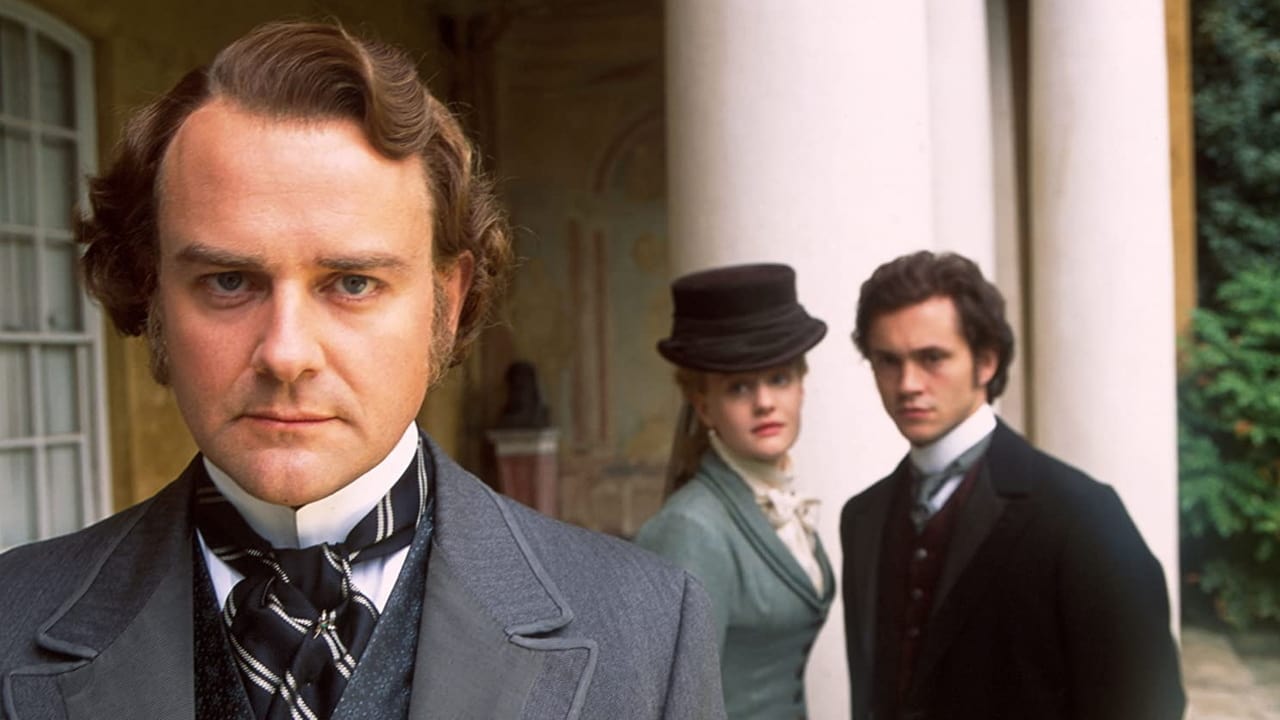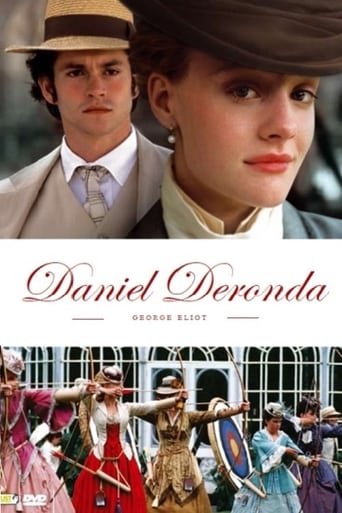

Kudos to Andrew Davies who continues to spook me out with his grasp on the mores and idiosyncrasies of English society of yesteryear. (I think he is secretly utilizing a time machine) The casting is flawless; Bonneville's character is almost intrinsically wicked. Although he illustrates that he is a man who understands financial investments, his dearth of understanding of the necessity of genuine emotional investments becomes his undoing. It may seem simplistic, but one hand does wash the other.....I expected Scacci's spurned mistress to have more sympathy for one as blinded as indeed she was when still young and alluring. Greta is formidable as a woman facing the aspect of Grandcourt's ultimate disloyalty, as she herself was disloyal to a spouse who must have trusted her to some degree... Daniel Deronda himself is much more than highly likable; he is a hero of the first order......This film is truly worth watching.
... View MoreIt was interesting to read the various comments put up here about the screen adaptation of Daniel Deronda. I watched it at the time it was first shown on television and thought it was really excellent. Then shortly afterwards, I came across the novel whilst on holiday and having enjoyed the television adaptation, I began to read the book and couldn't put it down. After that I felt compelled to go back to watch the televised version again and felt that although, as with any screenplay, it could not include every detail from the original novel, it captured the essence of the book extremely well and that it was truly inspiring. In fact I even re-read the book shortly afterwards. I thought the acting was superb and would certainly take issue with other user comments about both Gwendolyn and Daniel. Daniel was supposed to be almost saint-like and consequently somewhat removed from the other characters, although he did care deeply about them. I thought that Hugh Dancy did this very well, as it was so difficult to portray such a character. I certainly don't think he was in any way "wooden". He apparently said that having read the novel at university, he found it fascinating and helpful when filming to refer constantly to the original novel for guidance, and that needless to say, it gave him a much greater insight into the novel than when he had first read it. (Actually it was through watching Daniel Deronda that I became a loyal fan of Hugh Dancy.) I confess that I found myself quite illogically drawn to Gwendolyn's character as she advanced through the story to such an extent that the end of the screen version always makes me cry. Obviously she was intensely annoying to begin with, but she pays for her immaturity and her selfish and thoughtless behaviour by the end of the novel. I thought she was a far more interesting character than Mirah, not that I didn't think that Jodhi May was excellent in that role, but I loved the sexual tension between Gwendolyn and Deronda - the fact that they almost kissed but never did, so that in the end, even though you sensed it was a relationship going nowhere, you really wanted them to get physical. Of course Deronda was too honourable to do any such thing! Ah! Therein lies the attraction of the character for me: such purity and honour, (and of course Hugh Dancy is beautiful...) but there's not too much of that left these days - I refer to purity and honour.
... View More"Daniel Deronda" is a worthy knock-off of George Eliot's novel of the same name which tells of a young Englishman's search for meaning and purpose while enjoying a life of property and leisure. As with most Victorian period costume dramas out of the UK, this film is sumptuously appointed and well represented by the players and places as it meanders through the usual multiplicity of relationships from aristocrat to pauper with a Jewish thread for distinction. "Daniel Deronda" conjures a range of characters from a stoic martinet to a spoiled beauty to an attractive Jewess and beyond with love, greed, envy, guile, and death all swirling around the Deronda character as it manages to sort itself out with a coherent story arc and a more or less happy ending. A "should see" for anyone into Victorian flicks. (B)
... View MoreThe usual lush mini-series adapation from that reliable team, Andrew Davies and the BBC, of a literary property, this time George Eliot's almost forgotten last novel. Daniel (Hugh Dancy) is the gorgeous if slightly wet boy of mysterious parentage adopted by wealthy amiable old buffer Sir Hugo (Edward Fox). He falls in love with the wrong woman, the beautiful but self-absorbed Gwendolen (Romola Garai). She however is propelled into marriage with ace bounder (and Sir Hugo's heir) Henleigh Grandcourt (Hugh Bonneville). Daniel then becomes interested in Mirah (Johdi May), a promising singer of Jewish background, and through her ailing brother Mordecai (Daniel Evans) the Zionist cause (yes, hotting up as far back as the 1870s). Grandcourt meets a bounder's fate and Gwendolen is now free to marry Daniel, but guess what ?The costumes are great, the acting impeccable, the photography luminous but the story lacks punch. It is didactic rather than romantic, with metaphorical posters all over the place for women's rights and a homeland for the Jewish people. Hugh Dancy looks right for the part but Daniel is too much of a prig to be very likeable (though he has my sympathy when he discovers that Barbara Hershey, resplendent in a Venetian Palazzo is his mother Greta Scacchi would not have been so bad). The most engaging characters are Grandcourt the bounder and his sidekick Lush (David Bamber Mr Collins in `Pride and Prejudice') and yet we are meant to despise them both. Gwendolen is sympathetic to the extent she marries Grandcourt to provide financial security for her mother and sisters, but she is a real dork otherwise. Generally the characters lack the panache of say, Trollope's characters in `The Way We Live Now', or Eliot's own in `Middlemarch'. Perhaps Ms Eliot should have quit while she was ahead.The critics at the time (including Henry James) were baffled by the `Jewish' aspect of the story. It certainly was an outsider's view, yet it rings true today; here Ms Eliot was being prophetic, or was at least aware of the combination of repression, deprivation and myth that could give rise to a successful social movement. In 1876, the year the novel was published, it seemed most unlikely that Palestine would ever become a significant Jewish settlement. Daniel, desperate to find out about his background, finds a cause bigger than himself and eagerly throws himself into it. One has the feeling that Mirah, musically talented though she is, is going to be playing second fiddle.Anyway, I enjoyed Hugh Bonneville's Grandcourt, a terrific bounder, and David Bamber's Lush (Mr Collins turns bad). And of course, this is Sunday evening stuff, so one mustn't be too picky about the crummy plot and the unsympathetic principals. I usually find myself at this point thinking `I must read the book' (if I haven't already), but this time I don't think I'll bother.
... View More